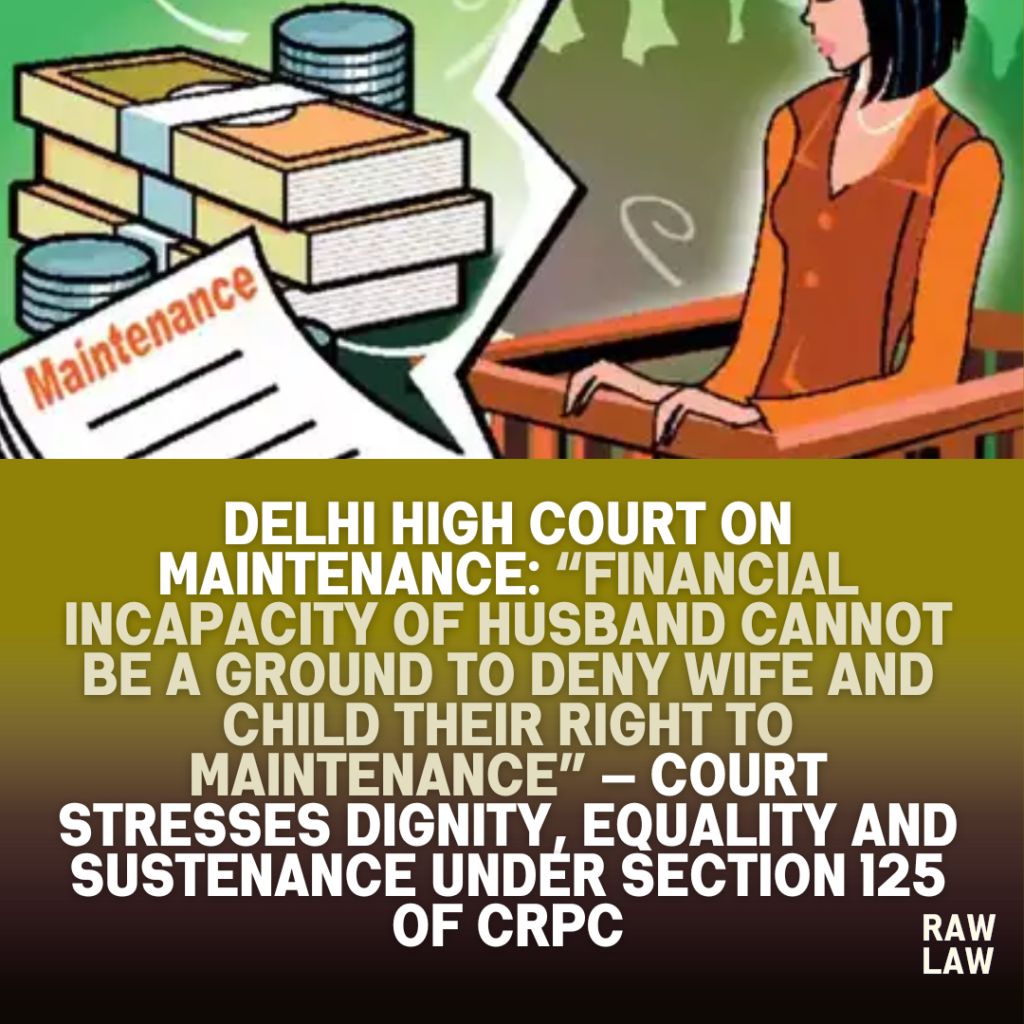Court’s Decision
The Delhi High Court upheld the Family Court’s order granting maintenance to a wife and her minor son under Section 125 of the Code of Criminal Procedure. The Court rejected the husband’s plea that his financial difficulties and lack of stable employment should exempt him from his obligation. Justice noted that “financial incapacity of the husband cannot absolve him of his statutory duty to maintain his wife and child”. The Court reiterated that the right to maintenance is a measure of social justice ensuring dignity, sustenance, and equality, and cannot be diluted by excuses of financial strain.
Facts
The wife had approached the Family Court under Section 125 CrPC seeking maintenance for herself and her minor son, asserting that her husband had neglected to provide for them despite having sufficient means. She alleged that she was compelled to take care of the household and child without any financial assistance, thereby suffering economic hardship.
The Family Court awarded monthly maintenance, holding that the husband had a statutory duty to maintain his wife and minor child. Aggrieved, the husband challenged the order before the High Court, contending that he lacked the financial means to comply due to unemployment and irregular income.
Issues
- Whether financial incapacity or lack of stable employment can exempt a husband from paying maintenance under Section 125 CrPC.
- Whether the Family Court’s assessment of maintenance was just and in accordance with law.
- Whether the right to maintenance is absolute or subject to the husband’s financial circumstances.
Petitioner’s Arguments
The husband argued that he was financially incapable of paying maintenance as directed by the Family Court. He contended that his unemployment and unstable income should be considered while fixing liability. He further submitted that awarding maintenance beyond his capacity amounted to imposing an unreasonable burden and would push him into destitution. According to him, the Family Court failed to appreciate the ground reality of his financial condition and fixed maintenance without proper inquiry.
Respondent’s Arguments
The wife defended the Family Court’s order, contending that the husband had deliberately avoided his responsibility despite having the capacity to earn. She argued that mere claims of unemployment could not absolve him of his statutory duty under Section 125 CrPC. She emphasized that she was compelled to fend for herself and the child without financial support, undermining their dignity and well-being. The respondent stressed that maintenance is not charity but a right, and the Family Court rightly ensured sustenance for her and her son.
Analysis of the Law
The Court analyzed Section 125 of the Code of Criminal Procedure, which imposes an obligation on a person with sufficient means to maintain his wife, children, and parents. The provision is intended to prevent destitution and vagrancy by compelling those with capacity to support dependents.
The Court held that capacity to earn, rather than actual earnings, is the determining factor for liability. It emphasized that every able-bodied man is presumed capable of maintaining his wife and child, even if unemployed or under financial stress. Thus, inability to secure employment cannot be a defense to evade statutory duty.
Precedent Analysis
The Court referred to several authoritative rulings:
- Bhuwan Mohan Singh v. Meena (2015) 6 SCC 353: The Supreme Court held that maintenance ensures dignity and sustenance, and financial incapacity cannot be pleaded as a defense.
- Chaturbhuj v. Sita Bai (2008) 2 SCC 316: The Court emphasized that an able-bodied husband cannot shirk responsibility by claiming lack of income; potential earning capacity is relevant.
- Shamima Farooqui v. Shahid Khan (2015) 5 SCC 705: The Court reiterated that excuses of financial incapacity are irrelevant when it comes to the fundamental duty of maintenance.
These precedents reinforced the principle that maintenance is a measure of social justice and is not contingent merely on the present state of the husband’s finances.
Court’s Reasoning
The Court observed that the husband’s plea of financial incapacity was untenable. It noted that the obligation to maintain dependents flows from both statutory law and moral duty, and excuses of unemployment or insufficient earnings cannot absolve an able-bodied man. The Court stressed: “A man cannot be permitted to plead penury when his wife and child are struggling for basic sustenance. His duty is to find ways and means to support them.”
It further observed that maintenance is intended to ensure dignity, equality, and social justice for women and children. The Court held that the Family Court had rightly fixed maintenance, and there was no illegality in the impugned order.
Conclusion
The High Court dismissed the husband’s challenge, affirming the Family Court’s maintenance order. It reiterated that the right to maintenance under Section 125 CrPC is not a matter of charity but a fundamental social justice measure ensuring dignity and sustenance. The judgment makes clear that excuses of financial incapacity cannot absolve a husband of his responsibility.
Implications
This ruling has significant implications for matrimonial law and maintenance disputes. It strengthens the principle that the right to maintenance is absolute, not contingent upon the financial excuses of the husband. The judgment deters attempts by husbands to avoid responsibility through claims of unemployment or unstable income. It also reaffirms the judiciary’s commitment to uphold women’s and children’s dignity and sustenance as central to social justice.
FAQs
1. Can a husband refuse to pay maintenance on the ground of unemployment?
No. Courts have held that an able-bodied husband is presumed capable of earning and cannot evade liability by citing unemployment or unstable income.
2. What is the purpose of Section 125 CrPC?
Section 125 CrPC is a measure of social justice intended to prevent destitution and ensure dignity and sustenance for wives, children, and parents who are unable to maintain themselves.
3. How do courts calculate maintenance?
Courts consider earning capacity, standard of living, and reasonable needs of the wife and children. The focus is on ensuring dignity and basic sustenance, not merely subsistence.



